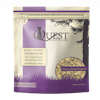
Considering that humanization has been a driving force in pet food for at least 10 years, you might think there would be nothing left to study or learn about this concept that long ago surpassed trend status. Yet earlier this year Nielsen released results of 2015 research, conducted with 3,562 US and French consumers ages 18-65 and owning at least one dog or cat, which yielded interesting new information regarding pet food label claims. (Read more at https://goo.gl/llAqU1).
The pet owners surveyed believe pet foods with natural claims have unique health advantages (think “natural digestive enzymes,” a claim that resonated with 65% of respondents), while claims such as “scientifically formulated” are falling out of favor. “Overall, the claim ‘scientifically formulated’ performed poorly when tested with consumers in actual product concepts; it appeared in only one top concept, where it generated mixed reactions,” the report said.
Of course, natural has also been a popular driver for some time; GfK reports that natural pet foods accounted for 80% of new product introductions in US pet specialty retail in 2015 and US$5.5 billion in sales—representing nearly 10% growth over 2014 and a 69% share of the specialty market. Packaged Facts estimates that natural products accounted for 28% of all US pet food sold (all channels), up about 11% in 2015. In its February/March 2016 National Pet Owner Survey, 54% of pet owners agreed that they place a high priority on buying pet food with natural ingredients; just 18% disagreed.
“Scientific” as a pet food claim is becoming polarizing, Nielsen asserted, partially due to confusion over its meaning. Which I find ironic, given that so many consumers are confused about the use of “natural” on human and pet foods that they’re even filing class-action lawsuits, and the US Food and Drug Administration is considering more formal regulation of the claim on human foods. And, isn’t one of the largest areas of scientific study the natural sciences?
As with many issues, it’s a matter of perception. Nielsen’s report included quotes from pet owners such as, “When I see the word ‘scientific,’ it makes me think the food has added preservatives and hormones.” Nielsen recommended that pet food manufacturers wanting to leverage science-based strengths should explain exactly what those are and what terms like “scientifically formulated” mean—sound advice that applies to “natural” claims, too.



















